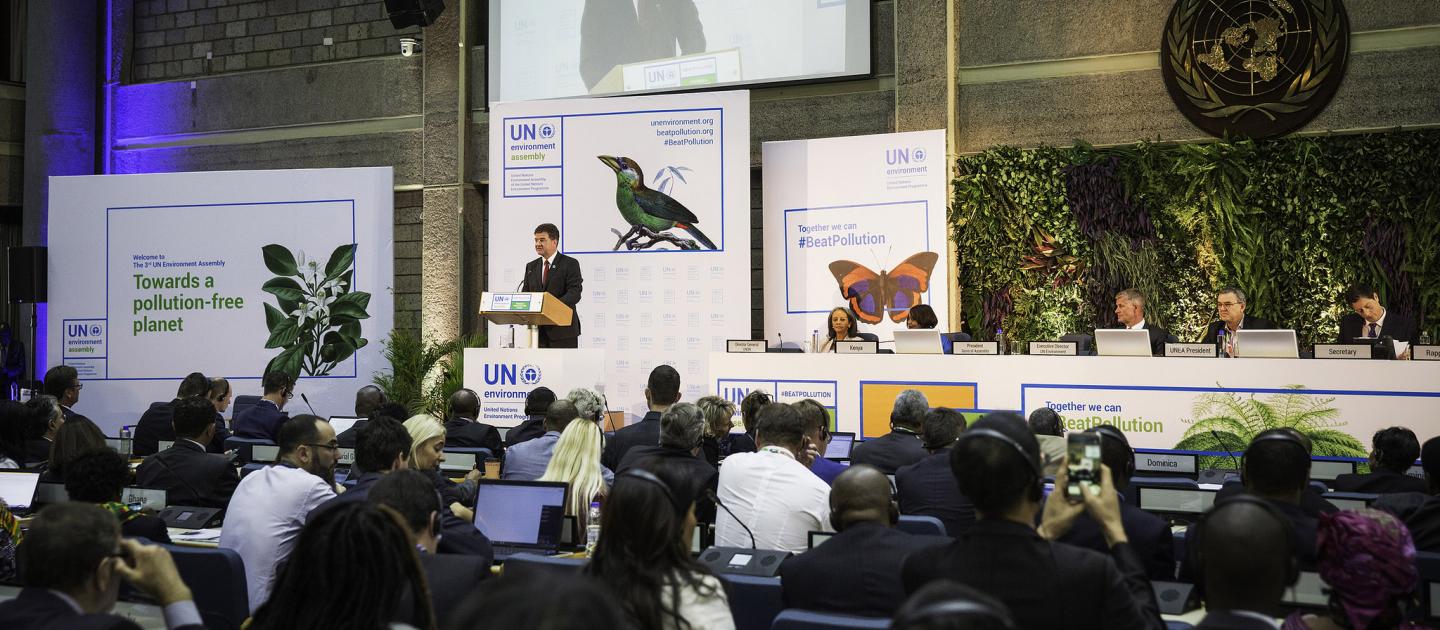
Over 4,000 stakeholders today converged on the green terrains of the UN office in Nairobi, Kenya to witness the opening ceremony of the 3rd United Nations Environment Assembly (UNEA3).
This year’s edition of the assembly, which is the highest –level decision-making body on the environment, aspires to consider new policies, innovations and financing capable of steering the world “Towards a Pollution-Free Planet.”
The UNEA-3 brings together governments, entrepreneurs, and activists who will share ideas and commit to taking positive action against the menace of pollution.
UNEA-3 aims to deliver a number of tangible commitments to end the pollution of air, land, waterways, and oceans, and to safely manage chemicals and waste, including a negotiated long-term programme of action against pollution that is linked to the Sustainable Development Goals (SDGs).
The High-Level Segment of UNEA-3, which will take place from 5-6 December, is also expected to endorse a political declaration on pollution, aimed at outlining policy measures for, inter alia: addressing pollution to protect human health while protecting the developmental aspirations of current and future generations.
The ministerial segment will debut the interactive ‘Leadership Dialogues,’ aimed at providing participants with an opportunity for high-level engagement and discussion on how to achieve a pollution-free planet.
Other UNEA-3 outcomes will include voluntary commitments by governments, private sector entities and civil society organizations to address pollution, and the ‘#BeatPollution Pledge,’ a collection of individual commitments to clean up the planet.
Discussions at UNEA-3 will draw on a background report by the UNEP Executive Director, titled ‘Towards a Pollution-Free Planet.’
The Report explores the latest evidence, as well as responses and gaps in addressing pollution challenges, and outlines opportunities that the 2030 Agenda presents to accelerate action on tackling pollution.
Welcoming delegates to the assembly, Prof. Judy Wakhungu, Kenya’s Cabinet Secretary for Environment and Natural Resources, declared that the assembly’s focus on beating pollution is very timely as pollution increases with every effort to provide services to our citizens.
“It is time, the world addressed this challenge without delay and agree on a common goal as a pollution-free planet cannot be achieved without working together,” she said.
The environment is our responsibility; it is the source of our wellbeing. The fate of our world depends on the quality of the care we give it,” Prof Wakhungu added.
“Our collective goal must be to embrace ways to reduce pollution drastically,” said Dr. Edgar Gutiérrez, Minister of Environment and Energy of Costa Rica and the President of the 2017 assembly.
“Only through stronger collective action, beginning in Nairobi this week, can we start cleaning up the planet globally and save countless lives.”
New report on the environment
According to a new UN Environment report, everyone on earth is affected by pollution.
The report entitled “Executive Director’s Report: Towards a Pollution-Free Planet” is the meeting’s basis for defining the problems and laying out new action areas.
The report’s recommendations – political leadership and partnerships at all levels, action on the worst pollutions, lifestyle changes, low-carbon tech investments, and advocacy – are based on analysis of pollution in all its forms, including air, land, freshwater, marine, chemical and waste pollution.
Overall, environmental degradation causes nearly one in four of all deaths worldwide, or 12.6 million people a year, and the widespread destruction of key ecosystems.
Over a dozen resolutions are on the table at the assembly, including new approaches to tackle air pollution, which is the single biggest environmental killer, claiming 6.5 million lives each year. Over 80% of cities operate below UN health standards on air quality.
The report reveals that exposure to lead in paint, which causes brain damage to 600,000 children annually, and water and soil pollution are also key focus areas.
Also, over 80 percent of the world’s wastewater is released into the environment without treatment, poisoning the fields where we grow our food and the lakes and rivers that provide drinking water to 300 million people.
According to recently published report by the Lancet Commission on Pollution and Health, welfare losses due to pollution are estimated at over US$4.6 trillion each year, equivalent to 6.2 per cent of global economic output.
“Given the grim statistics on how we are poisoning ourselves and our planet, bold decisions from the UN Environment Assembly are critical,” said head of UN Environment, Erik Solheim. “That is as true for threats like pollution as it is for climate change and the many other environmental threats we face.”
Corroborating the report, Ibrahim Jibril, Nigeria’s Minister of State for Environment in his statement at the plenary averred that “pollution affects the air, soil, rivers, seas and health of Nigerians in an adverse way even though the actual cost has not been determined. Trans-boundary pollution, according to Jibril, “accounts for 28% of disease burdens in Africa.”
The UNEA-3 will run from 4-6 December.











